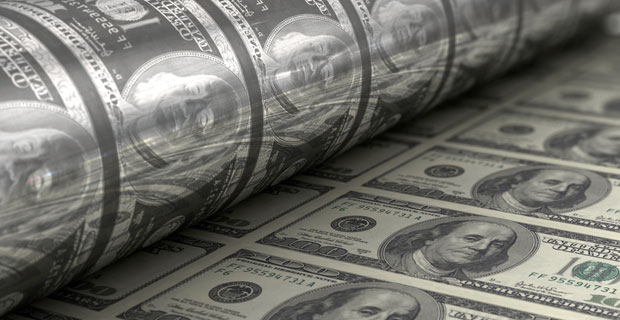J. Keith Johnson


Over the past 40 years, the Federal Reserve has been force-feeding the world the idea that its printing press puts out more valuable paper than anyone else’s. This is, of course, because in 1971 it was given legislative approval to manage the U.S. currency, without any asset restrictions.
At the time the world was already addicted to U.S. dollars as a reserve currency due to the dollar’s tie to gold. As long as the dollar remained pegged to gold (at least in theory), other countries’ currencies maintained the same tie in proportion to their dollar reserves.
At first the nations balked when Nixon cut the golden thread, ending the world’s last true money base and creating the greenback. They knew that he had just undercut their value, and the dollar fell hard at first. However, they soon realized that a falling dollar was bad for their own currency, so they adopted a more accepting posture. Since then the management of the world’s reserve currency has rested in the hands of the Fed.
Over the years the American people have grown accustomed to the fiat currency. Realizing that inflation would destroy savings over a long period of time, spending became much more acceptable. After all, why save a thousand dollars only to see its purchasing power diminish over the years? Better to buy what you want and enjoy it now. So, as the time passed, Americans became net spenders rather than net savers.
There was a time when banks and Wall Street weren’t allowed to share the same bed; at least not officially. Banks needed to concentrate on serving customers and keep their interests from being clouded by markets. Everyone understood that once banks started getting involved in the markets, caring for customers’ cash would become secondary to shooting for massive profits.
When Glass-Steagall was repealed in 1999, it was already all but dead. Legislators had neglected to uphold the act, allowing banks to grow in their securities’ interest. While it would have been better to have never implemented Glass-Steagall in the first place (letting the natural forces of the market run their course), passing it and then, years later, not enforcing it was even worse.
As the money supply became less restricted and the banks less regulated, the inevitable occurred. The banks became addicted to easy money. And, of course, they passed this easy money off to the people. Everyone was enjoying easy money, while very few were considering the consequences.
What happens to a wild animal if someone constantly leaves scraps out for them to eat? They become accustomed to the scraps. The hunting instinct gives way to easy food. The healthy living of a varied diet, running, hunting, gathering and working to survive is replaced with complacency, a poor diet, easy food and, eventually, they become less healthy. But they also become so accustomed to it that, rather than appreciating a little help at a time when they might have needed it, they come to expect it as their mainstay.
Welcome to Western civilization in the 21st century. From the top down, we’ve become addicted to easy money. The problem is, there’s a price to pay. Our addiction has enslaved us to the whims and mechanisms of the central bankers.
Consider the recent announcement. As the drug addicts (bankers/Wall Street) lined up waiting to hear what would happen, their mouths watered for more QE. Never mind that past QE only offered a temporary fix. Never mind that inflation is destroying the backbone of our economy, the working man. They just wanted their fix. And, of course, they got it. In fact, they were promised that it wouldn’t end until their bellies were full.
How long did it take before their bellies groaned again? By the end of the first week we’re seeing cries for more QE. QE∞ simply wasn’t enough. The addict is crying for another fix. To whatever degree the pusher complies, the addiction will deepen and the health of the addict will deteriorate. The only answer lies in breaking free of the addiction.
In the immediate term, the best way to do so is likely to accumulate assets that do not diminish in value. Precious metals, some properties and other assets can stand the test of time. In the long run, for our posterity, the only solution is to be freed of the Fed shackles we’ve embraced. However, as voters have shown in a strange and sad irony, America is not ready for freedom.



